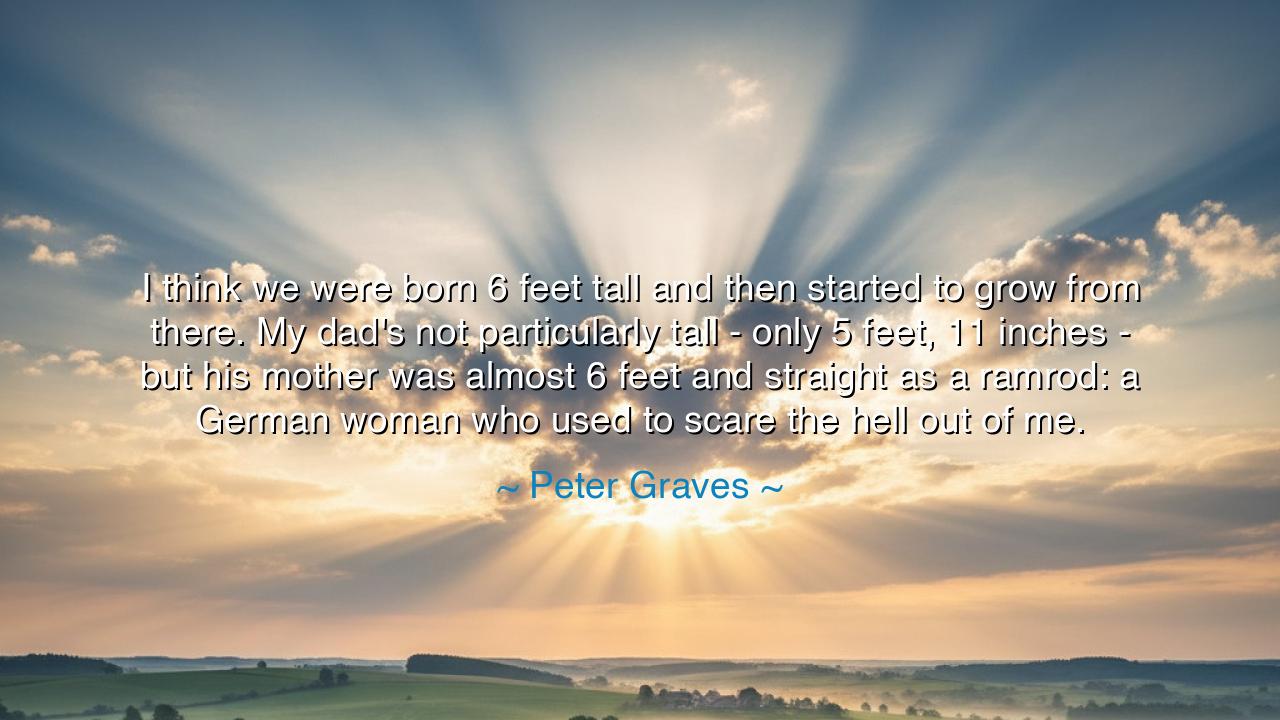
I think we were born 6 feet tall and then started to grow from
I think we were born 6 feet tall and then started to grow from there. My dad's not particularly tall - only 5 feet, 11 inches - but his mother was almost 6 feet and straight as a ramrod: a German woman who used to scare the hell out of me.






In the words of Peter Graves, “I think we were born 6 feet tall and then started to grow from there. My dad’s not particularly tall — only 5 feet, 11 inches — but his mother was almost 6 feet and straight as a ramrod: a German woman who used to scare the hell out of me.” At first glance, this quote may seem humorous, even casual, as if the actor were simply reflecting on his family’s height. Yet beneath its surface lies a rich undercurrent of meaning — a reflection on heritage, strength, and the awe of ancestry. Graves, known for his calm authority and towering presence on screen, here speaks with reverence of the towering spirits from whom he descended. His words remind us that our roots, like unseen pillars, shape not only our bodies but our character — that we grow not only upward in stature, but inward in identity.
The image of being “born 6 feet tall” is no mere exaggeration; it is a poetic declaration of inherited greatness. It suggests that one’s sense of presence — one’s inner height — is not measured in inches, but in the spirit carried from one generation to the next. Graves’ father, modest in height yet dignified, and his grandmother, tall and commanding, represent two sides of lineage: gentleness and might, humility and pride. The phrase “straight as a ramrod” captures more than posture; it evokes moral fortitude, the unbending will of those who stand upright not only in body, but in principle. His grandmother’s German steel, both admired and feared, became the ancestral flame that tempered the family’s strength.
The origin of this quote arises from Graves’ reflections on his family background and the formidable figures who defined it. Known best for his leadership roles in Mission: Impossible and his dignified composure, Graves often credited his upbringing for his sense of discipline and resolve. His grandmother, though intimidating, embodied an older generation’s stern virtues — courage, discipline, and an unyielding sense of duty. Her height became a symbol of her spirit: tall not for vanity’s sake, but because she refused to bow before life. Through her, Graves inherited more than genetics; he inherited the posture of resilience.
The ancients would have recognized in this story the eternal chain of ancestral strength — how the virtues and temperaments of our forebears live on in us, as rivers flow from the same mountain source. Just as Achilles inherited the valor of his mother Thetis, or Alexander the Great drew courage from his warrior lineage, so too did Peter Graves see his own life shaped by the towering example of those before him. The grandmother’s uprightness becomes a metaphor for all the elders who stand behind us — unbending, vigilant, shaping the generations that follow. To fear them, as Graves once did, is to acknowledge their power; to love them, as he clearly did, is to honor the source from which our own strength flows.
Yet there is something tender within his humor — a recognition that even those who seem fearsome in youth become, in memory, pillars of gratitude. The child who trembles before authority often grows to understand its purpose. What once seemed severity is later seen as love expressed through expectation — the silent demand to stand tall, to live with integrity, to carry forward the family flame. Graves’ grandmother, “straight as a ramrod,” becomes not a symbol of coldness, but of the unbroken line of endurance that gives each new life its foundation.
There is also in this quote a reflection on the duality of inheritance — how we carry both strength and gentleness, courage and fear. Graves’ humor reveals wisdom: that we are shaped by contradiction, by the interplay between admiration and intimidation, love and discipline. The ancestors who “scared us” in childhood often become the guardians of our adulthood — figures we emulate without realizing it, their voices echoing within our conscience. In this way, to “grow” beyond them is not to surpass them, but to continue their story in a new form.
The lesson, then, is one of remembrance and reverence. Know where you came from. Look not only at your parents and grandparents as people of the past, but as living influences that continue within you. The way they stood, the way they spoke, the values they carried — these are the unseen measures of your own height. To be “born tall” is to inherit not just the body, but the spirit of stature — the uprightness that comes from generations of struggle, endurance, and faith.
So, my listener, stand tall — not merely in pride, but in acknowledgment of those who stood before you. Carry their posture of courage, even when it feels heavy. Let their strength be your backbone, their lessons your compass. For in honoring them, you grow beyond them, adding your own inch to the lineage of greatness. Thus, when Peter Graves says, “We were born six feet tall,” he is not boasting of height — he is confessing a truth known since ancient days: that every soul stands upon the shoulders of its ancestors, and that true growth begins when we recognize the giants from whom we descend.






AAdministratorAdministrator
Welcome, honored guests. Please leave a comment, we will respond soon